HIST 1B
California State University - San Jose State University
Page 2 out of 34 results
Sort by

-
HIST 1b - Unit 3_ Legitimizing Political Rule (Student Handout)
- Exam (elaborations) • 4 pages • 2023
-
- $9.49
- + learn more
Unit 3: Topic 3.2 - Legitimizing Political Rule Case Study Student Handout Today’s Inquiry Questions ● What methods did French monarch Louis XIV use to legitimize and consolidate his power in the 1450-1750 time period? ● How does Louis XIV embody the concept of absolute monarchy? Define: What is absolutism? The absolute power of the leader in an empire or country. They have unlimited centralized authority and absolute sovereignty. Artifact What methods did French monarch Louis XI...

-
HIST 1b Unit 5_ Atlantic Revolutions Graphic Organizer
- Exam (elaborations) • 3 pages • 2023
-
- $10.49
- + learn more
American Revolution 1765-1783 French Revolution 1789-1799 Haitian Revolution 1791-1804 What factors caused this revolution? Be specific. The American colonists wanted independence from the rule of the British. The ideas of Enlightenment also helped them to start a revolution against the British. During this period, France had economic instability. The monarch collects a lot of taxes and most of the money they collect is used to aid American colonists for the American revolut...
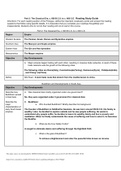
-
HIST 1b Unit 3 - Land-Based Empires
- Exam (elaborations) • 6 pages • 2023
-
- $9.49
- + learn more
Part 2: The Classical Era, c. 600 B.C.S. to c. 600 C.E. Region Empire Western Eurasia The Persian, Greek, Roman and Byzantine empires Southern Asia The Mauryan and Gupta empires Eastern Asia The Qin and Han dynasties Mesoamerica The Mayan empires Objective Key Developments A. Major empires began trading with each other, resulting in massive trade networks. A result of these trade networks was the growth of the following cities: The following cities are Rome(Italy), Constantinople(Turkey...
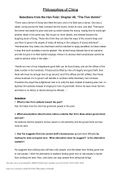
-
HIST 1b 3 Philosophies of China study guide
- Exam (elaborations) • 4 pages • 2023
- Available in package deal
-
- $8.49
- + learn more
Philosophies of China Selections from the Han Feizi: Chapter 49, “The Five Vermin” “There was a farmer of Song who tilled the land, and in his field was a stump. One day a rabbit, racing across the field, bumped into the stump, broke its neck, and died. Thereupon the farmer laid aside his plow and took up watch beside the stump, hoping that he would get another rabbit in the same way. But he got no more rabbits, and instead became the laughing stock of Song. Those who think they can ...
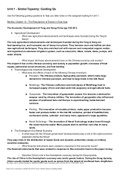
-
HIST 1b - Unit 1 - Global Tapestry_ Guiding Qs
- Other • 5 pages • 2023
- Available in package deal
-
- $8.49
- + learn more
Unit 1 - Global Tapestry: Guiding Qs Use the following guiding questions to help you take notes on the assigned reading for Unit 1. Bentley Chapter 14 - The Resurgence of Empire in East Asia The Economic Development of Tang and Song China (pp 335-341) ● Agricultural Development ○ What new agricultural advancements and techniques were founded during the Tang & Song? The new agricultural advancements and techniques founded during the Tang & Song are fast-ripening rice, and increased us...

-
HIST 1b 2.3 Powerpoint Organizer latest Fall 2023
- Exam (elaborations) • 2 pages • 2023
- Available in package deal
-
- $8.49
- + learn more
Topic 2.3 Exchange in the Indian Ocean Learning Objective Explain the causes of the growth of networks of exchange after 1200. Historical Developments Improved transportation technologies and commercial practices led to an increased volume of trade and expanded the geographical range of existing trade routes, including the Indian Ocean, promoting the growth of powerful new trading cities. The growth of interregional trade in luxury goods was encouraged by significant innova...
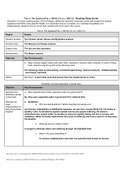
-
HIST 1b - Unit 3 - Land-Based Empires 1450-1750.
- Exam (elaborations) • 6 pages • 2023
-
- $8.49
- + learn more
Part 2: The Classical Era, c. 600 B.C.S. to c. 600 C.E. Region Empire Western Eurasia The Persian, Greek, Roman and Byzantine empires Southern Asia The Mauryan and Gupta empires Eastern Asia The Qin and Han dynasties Mesoamerica The Mayan empires Objective Key Developments A. Major empires began trading with each other, resulting in massive trade networks. A result of these trade networks was the growth of the following cities: The following cities are Rome(Italy), Constantinople(Turkey...
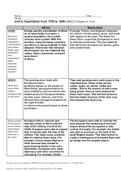
-
HIST 1b All Units with Final Exam & Study Guides d ,assignment, study guide all in this package deal Complete(Latest Update 2023)
- Package deal • 18 items • 2023
-
- $25.49
- + learn more
HIST 1b All Units with Final Exam & Study Guides d ,assignment, study guide all in this package deal Complete(Latest Update 2023)

-
HIST 1b Unit 6_ Imperialism from 1750-1900.
- Exam (elaborations) • 4 pages • 2023
- Available in package deal
-
- $8.49
- 1x sold
- + learn more
CAUSES Why were Europeans interested in colonizing this area? What factors were driving this new imperialism? What resources attracted European interest? Europe saw the colonization of Africa as an opportunity to acquire a surplus population, thus settler colonies were created. With this invasion, many European countries saw Africa as being available to their disposal. Resources that attracted the European are raw materials like rubber, timber, diamonds, and gold were fou...
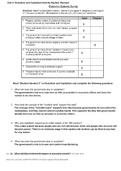
-
HIST 1b Unit 5_ Socialism & Capitalism Student Handout
- Exam (elaborations) • 6 pages • 2023
- Available in package deal
-
- $8.49
- + learn more
1. What role does the government play in capitalism? The government’s role is to intervene as little as possible in economic affairs and leave the market to its own device. 2. How does the concept of the “invisible hand” support this idea? The concept of the “Invisible hand” supports this idea because governments do not control the marketplace, and they cannot control invisible hands. This supports the idea that governments should intervene as little as possible in economic affai...



